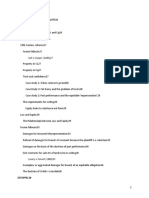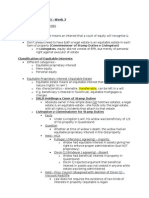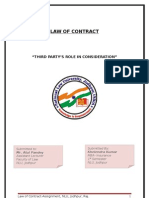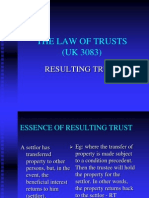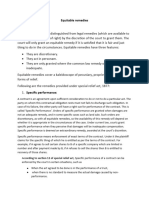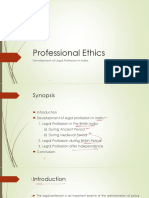Equity Notes Assingment
Equity Notes Assingment
Uploaded by
Louise ZhanCopyright:
Available Formats
Equity Notes Assingment
Equity Notes Assingment
Uploaded by
Louise ZhanCopyright
Available Formats
Share this document
Did you find this document useful?
Is this content inappropriate?
Copyright:
Available Formats
Equity Notes Assingment
Equity Notes Assingment
Uploaded by
Louise ZhanCopyright:
Available Formats
Equitable Assignment of Legal Property Where there is an equitable assignment the donor will hold the legal interest
t on trust for the donee. Questions about assignments o Is it a gift or was there valuable consideration? o What type of property is being assigned? o Is the interest in the property legal or equitable? o What are the requirements for assigning that interest in property at law and in equity? o What steps has the donor taken to assign the property? o Are those steps effective to complete the assignment at law or in equity? Valuable consideration must be more than nominal but need not reflect the full value (Corin v Patton) Equitable property o Interest of a beneficiary under a trust o Equitable mortgages o Rights under a partnership o Legatees right to an unadministered estate (chose in action) Livingstons case Chose in action - an intangible right enforceable only by taking legal action (debt). Property assignable in equity only o Equitable interests in property o Future property o Parts of a chose in action eg. Half of a debt. If all the steps for the assignment of legal property at law are not complied with equity may still regard the transfer as complete. For this to happen, in the case of a voluntary assignment, the assignor must have done EVERYTHING NECESSARY to transfer the property and render the settlement binding on himself. (Milroy v Lord) The meaning of Everything Necessary o In Corin v Paton the High Court adopted the view of Griffith CJ in Anning v Anning. o Under this construction, everything necessary means that the donor must take all the statutory steps that can only be taken by the donor personally. An assignment will be complete in equity if the remaining statutory steps can be taken by the assignee. In Corin v Paton, the High Court held that a gift of Torrens Title property would be beyond intervention and recall (and therefore be complete) if the donor delivered an executed memorandum of transfer and the certificate of title, or means of obtaining the certificate of title, to the donee. In Costin v Costin, the NSWCA held that merely giving the donee the means to obtain the certificate of title may not be sufficient to complete an equitable assignment of real property. Gifts must be beyond the recall of the donor (irrevocable).
Assignment of chose in action o At law a chose in action can be assigned by compliance with s12 Conveyancing Act o This requires A clear intention to assign An absolute assignment (all of the debt unconditionally) Writing Signed by the assignor Written Notice provided to the debtor (by assignor/assignee) o No need for consideration or a deed. o In equity a chose in action can be assigned if it is: Intentional Irrevocable Immediate (Norman v FCT) o The absence of notice will not defeat the assignment as this can be done by the donee (Comptroller of Stamps v Howard Smith) o An oral assignment of a legal chose in action will be effective in equity (Norman v FCT / Shepherd v FCT) o An equitable chose in action will be a subsisting equitable interest and under s23C(1)(c) of the Conveyancing Act writing would be required for a valid assignment in equity.
Assignments of Equitable Interests A valid voluntary assignment of equitable property usually requires o A clear expression of an intention to make an immediate disposition (Norman v FCT) o That the assignment be evidenced in writing, pursuant to the relevant section of the Conveyancing Act Questions to ask o What is the mode of dealing? o Is there evidence of a clear and immediate intention to dispose of the property in that way? o Can that form of assignment be done orally? Forms of dealing (Timpsons Executors v Yerbury) o A donor can assign property to the party directly o A donor can declare themselves a trustee of the interest for a third party o A donor can direct the trustees to hold the property on trust for a third party o A donor can contract for valuable consideration to assign the equitable interest. The steps taken must be those required for that particular form of dealing. Even if they would make another form of dealing valid they will not make the gift complete. (Milroy v Lord) The form of dealing will be determined by the actual intention of the donor.
The court will consider the text of the document and the document in the context of the surrounding circumstances (Comptroller of Stamps v Howard-Smith) Section 23C(1) Conveyancing Act o (a) and (c) must actually be in writing whereas (b) need only be manifested and proved by writing o A trust with respect to land only requires compliances with (b). In other words it needs to manifested and proved by writing and that writing can be made after the oral declaration of trust. (Department of Social Security v James) o (a) and (c) allow the writing to be done by an authorised agent. (b) does not allow an agent to do the writing. o (c) applies to both real and personal property (Adamson v Hayes) o (c) applies only to subsisting equitable interests in both personal and real property. It does not apply to the creation of an equitable interest for the purpose of disposition eg. a declaration of trust over personal property. o An oral declaration of trust over personal property would be valid (Grey v IRC) A revocable mandate is a form of authority to act. An interest cannot pass until the mandate is acted upon. If the mandate is acted upon then the assignment will be complete. But, if the mandate is revoked (expressly or by the death of the donor) before it is acted upon, the assignment will fail. Direct assignments occur where the donor attempts to immediately give their equitable interest in property to another. The necessary elements are the 3 EYEs o Intention o Immediate o Irrevocable (Norman v FCT) Writing will be required. (c) if personalty and (a) if real property. Notice will not be necessary. (Comptroller of Stamps v Howard-Smith) Parts of choses in action are assignable in equity where the 3 EYEs are present. There is no requirement of writing as it is not a subsisting equitable interest and therefore not caught by s23C(1)(c) A declaration of trust is constituted when the assignor declares that they retain their interest but now hold it on trust for the assignee (sometimes called a subtrust). Writing will be required as will the 3 EYEs. Notice will not be necessary.
You might also like
- A Holistic Appraisal of The Concept of Trust Under The Nigerian JurisprudenceDocument89 pagesA Holistic Appraisal of The Concept of Trust Under The Nigerian Jurisprudencedavitech44No ratings yet
- EQUITY & TRUST LAW List of Cases According To Topic PDFDocument45 pagesEQUITY & TRUST LAW List of Cases According To Topic PDFNurina Yusri100% (2)
- Equity and Trusts EssayDocument7 pagesEquity and Trusts EssayKatrina BestNo ratings yet
- The Three Certainties and FormalitiesDocument6 pagesThe Three Certainties and FormalitiesSanveer Keshav Jugtah80% (5)
- EquityDocument25 pagesEquityAli Azam Khan100% (11)
- The Need For The Abolition of Secret TrustsDocument11 pagesThe Need For The Abolition of Secret TrustseuodiaNo ratings yet
- U.P. Municipalities Act, 1916Document1 pageU.P. Municipalities Act, 1916Adv PandeyUtkarshNo ratings yet
- Equity NotesDocument281 pagesEquity NotesNaina ParasharNo ratings yet
- The Maxims of EquityDocument13 pagesThe Maxims of EquityChameen ParanagamaNo ratings yet
- GENERAL - Tourism Law - IntroductionDocument102 pagesGENERAL - Tourism Law - IntroductionQuỳnh HươngNo ratings yet
- Fraud Upon The Court - andDocument3 pagesFraud Upon The Court - andRicharnellia-RichieRichBattiest-Collins100% (2)
- Resulting Trust Essay PlanDocument3 pagesResulting Trust Essay PlanSebastian Toh Ming WeiNo ratings yet
- What Were The Jurisdictions of Equity Court.Document1 pageWhat Were The Jurisdictions of Equity Court.Hurreh100% (1)
- LAWS3113 - Exam Notes 2 - Equitable Property Interests - COMPLETEDocument4 pagesLAWS3113 - Exam Notes 2 - Equitable Property Interests - COMPLETEEleanor FooteNo ratings yet
- Freehold Covenants (2020)Document13 pagesFreehold Covenants (2020)mickayla jones100% (1)
- Capacity, Appointment and Removal of Trustees: ELEMENT 1: State The Parties Element 2: CapacityDocument5 pagesCapacity, Appointment and Removal of Trustees: ELEMENT 1: State The Parties Element 2: CapacityJusween Sathar100% (1)
- Law of Equity and TrustDocument27 pagesLaw of Equity and TrustokonemediongbNo ratings yet
- Contract AssignmentDocument8 pagesContract Assignmentapi-3806283100% (2)
- Land Transactions Lecture Guide NotesDocument74 pagesLand Transactions Lecture Guide NotesChloeNo ratings yet
- Proprietry EsstopelDocument3 pagesProprietry EsstopelsyedNo ratings yet
- Imperfect GiftsDocument2 pagesImperfect GiftsAdam 'Fez' FerrisNo ratings yet
- Equity Personal NotesDocument65 pagesEquity Personal NoteshouselantaNo ratings yet
- Equity NotesDocument306 pagesEquity NotesOlman Fantastico100% (1)
- Equity and Trusts - Tutorial Sheet No. 2Document2 pagesEquity and Trusts - Tutorial Sheet No. 2Eniahpets EworNo ratings yet
- Nutshells Equity and Trusts 9e Breach of Trust and Associated Remedies Topic GuideDocument30 pagesNutshells Equity and Trusts 9e Breach of Trust and Associated Remedies Topic Guideskyreach100% (3)
- Equity Notes InjunctionsDocument4 pagesEquity Notes InjunctionsMegan TraversNo ratings yet
- Enforcing Private Purpose TrustsDocument4 pagesEnforcing Private Purpose TrustsZHUMENG FU100% (2)
- Assignment of Choses in ActionDocument12 pagesAssignment of Choses in ActionAnjola AlakabaNo ratings yet
- Tort Law NuisanceDocument9 pagesTort Law Nuisancetisilva18No ratings yet
- Evaluation of The Re Rose 1952 PrincipleDocument8 pagesEvaluation of The Re Rose 1952 PrincipleAce Jothi100% (1)
- Transfer of PropertyDocument7 pagesTransfer of PropertySourabh BansalNo ratings yet
- Equity & Trusts Example EssayDocument13 pagesEquity & Trusts Example EssayCollette Petit100% (2)
- Resulting TrustDocument20 pagesResulting TrustBenjamin Goo KW100% (1)
- Land AssignmentDocument7 pagesLand AssignmentDiana Mills100% (1)
- Consideration Summary NotesDocument11 pagesConsideration Summary NotesBrian PetersNo ratings yet
- Equitable Recoupment - Revisiting An Old and Inconsistent RemedyDocument100 pagesEquitable Recoupment - Revisiting An Old and Inconsistent RemedyJake MacTavishNo ratings yet
- Equity and Trust Group 4 - q1Document7 pagesEquity and Trust Group 4 - q1irainy143No ratings yet
- Proprietry EstoppelDocument4 pagesProprietry Estoppelmednasrallah100% (1)
- Mortgages 1Document36 pagesMortgages 1SwatiBhartiNo ratings yet
- Equitable Interest Estate and Proprietary EstoppelDocument87 pagesEquitable Interest Estate and Proprietary EstoppelAmanda Penelope Wall100% (3)
- LAWS3113 Lecture 1 - Introduction To Equity and TrustsDocument9 pagesLAWS3113 Lecture 1 - Introduction To Equity and TrustsThoughts of a Law StudentNo ratings yet
- Maxims of EquityDocument19 pagesMaxims of EquityRikesh Jhumry100% (1)
- PennerDocument81 pagesPennermanavmelwani100% (2)
- Unregistered LandDocument7 pagesUnregistered LandVicky TassellNo ratings yet
- Criminal Breach of TrustDocument13 pagesCriminal Breach of Trustharsh yadavNo ratings yet
- Assignment On Trust Equity and Fiduciary RelationshipDocument7 pagesAssignment On Trust Equity and Fiduciary RelationshipDeepak Kumar100% (4)
- In Re Okine (Decd) Dodoo and Another v. Okine and OthersDocument35 pagesIn Re Okine (Decd) Dodoo and Another v. Okine and OthersMusah YahayaNo ratings yet
- Land As "Property"Document29 pagesLand As "Property"Natasha DenningtonNo ratings yet
- Land Law NotesDocument7 pagesLand Law NoteshibaNo ratings yet
- Equitable RemediesDocument6 pagesEquitable RemediesEsha JavedNo ratings yet
- One Who Comes Into Equity Must Come With Clean HandsDocument2 pagesOne Who Comes Into Equity Must Come With Clean HandsJeree Jerry Azree100% (4)
- Mortgages SlidesDocument66 pagesMortgages SlidesFuck You100% (2)
- Sale of Goods Act 1930Document23 pagesSale of Goods Act 1930Dilfaraz KalawatNo ratings yet
- Freehold Covenants ADocument3 pagesFreehold Covenants Aapi-234400353No ratings yet
- Equity ExamNotesDocument44 pagesEquity ExamNotesusherthNo ratings yet
- The Laws Of War, Affecting Commerce And ShippingFrom EverandThe Laws Of War, Affecting Commerce And ShippingNo ratings yet
- Equity NotesDocument37 pagesEquity NotesFlorentina DiamondNo ratings yet
- Constitution of TrustsDocument7 pagesConstitution of TrustsMitchell MillerNo ratings yet
- 367308171-Uy-v-Capulong With Synospis and DoctrineDocument2 pages367308171-Uy-v-Capulong With Synospis and DoctrineJESSIE JAMES YAPAONo ratings yet
- Chapter - 1 Introduction To Intellectual Property RightsDocument3 pagesChapter - 1 Introduction To Intellectual Property RightsChindhu SivasubramanianNo ratings yet
- Criminal Law IiDocument5 pagesCriminal Law Iiamagpantay114No ratings yet
- Content of Legislation and ClausesDocument8 pagesContent of Legislation and Clauseslenovocorei3insideNo ratings yet
- Q and A FCI SCI TAIDocument23 pagesQ and A FCI SCI TAIJennifer Rose BauzonNo ratings yet
- Hostel Application Form 240815Document3 pagesHostel Application Form 240815Ahmadhussain AhmadhussainNo ratings yet
- A Dialogue and Forum On The Strengthening of The Barangay Anti-Drug Abuse Councils (Badacs) in The City of Bacoor An Activity DesignDocument2 pagesA Dialogue and Forum On The Strengthening of The Barangay Anti-Drug Abuse Councils (Badacs) in The City of Bacoor An Activity Designchristopher riveraNo ratings yet
- Amended By-Laws of The Association of Senior Citizen of Barangay One, Tumauini, IsabelaDocument3 pagesAmended By-Laws of The Association of Senior Citizen of Barangay One, Tumauini, Isabelamardee justo100% (5)
- Plaza V LustivaDocument4 pagesPlaza V LustivaChelle BelenzoNo ratings yet
- Statcon Case DigestsDocument2 pagesStatcon Case DigestsJapsalm Lyann AstudilloNo ratings yet
- Stern, S. The Human Rights ParadoxDocument33 pagesStern, S. The Human Rights ParadoxSebadtiánNo ratings yet
- Before Secretary (S& R) Chairman Verification Committee Farid Kot House, LahoreDocument4 pagesBefore Secretary (S& R) Chairman Verification Committee Farid Kot House, Lahorehearthacker_302No ratings yet
- Rosaldes Vs PeopleDocument1 pageRosaldes Vs PeopleMark JR AlipioNo ratings yet
- CAE Vocabulary - Set 1Document2 pagesCAE Vocabulary - Set 1Icosium100% (1)
- 2014 Reptile TheoryDocument2 pages2014 Reptile TheoryOlga Smith100% (3)
- Offer Letter-Adnan GauriDocument2 pagesOffer Letter-Adnan Gauriadnangauri007No ratings yet
- CRISANTA G. HOSOYAvs. ATTY. ALLAN C. CONTADODocument3 pagesCRISANTA G. HOSOYAvs. ATTY. ALLAN C. CONTADOcatrina lobatonNo ratings yet
- Professional Ethics - DevelopmentDocument16 pagesProfessional Ethics - DevelopmentRajiv Bais100% (1)
- Equity and Trust Group Course WorkDocument15 pagesEquity and Trust Group Course WorkdowdenconsultgroupltdNo ratings yet
- Ethical and Legal Issues in NursingDocument35 pagesEthical and Legal Issues in NursingGem HimenaceNo ratings yet
- Drew Montgomery Walker v. U.S. Attorney General, 11th Cir. (2015)Document6 pagesDrew Montgomery Walker v. U.S. Attorney General, 11th Cir. (2015)Scribd Government DocsNo ratings yet
- Proved, Disproved and Not ProvedDocument1 pageProved, Disproved and Not ProvedDʌʀĸ Hʋŋtɘʀ AvijitNo ratings yet
- Milburn v. Uber and Honda PetitionDocument23 pagesMilburn v. Uber and Honda PetitionBrad JohnsonNo ratings yet
- AffService Hand Div 0313V2Document2 pagesAffService Hand Div 0313V2randonstringNo ratings yet
- Gifts Under Islamic Law 2Document24 pagesGifts Under Islamic Law 2Utkarsh SinghNo ratings yet
- Example of Criminal Justice ThesisDocument7 pagesExample of Criminal Justice Thesisangelicaortizpaterson100% (1)
- Solomon V SolomonDocument2 pagesSolomon V SolomonYAKUBU ISSAHAKU SAIDNo ratings yet







